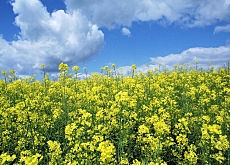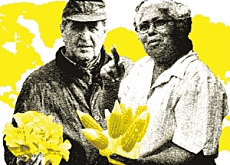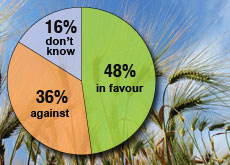GM crops win ground on a global level

The commercial use of genetically modified (GM) crops is increasingly popular, but Swiss environmentalists want to impose a moratorium.
GM supporters, mainly in the United States and developing countries, argue that these crops help in the fight against hunger and poverty.
Latest figures by the International Service for the Acquisition of Agri-biotech Applications (ISAAA) show sustained growth rates for GM crops over the past decade.
Last year 81 million hectares (200 million acres) of land were used in 18 countries for transgenic plants, including cotton, maize (corn), soy, wheat and rapeseed, the non-profit network said.
The organisation, which is supported by the Swiss foreign ministry and the Swiss agrochemicals firm, Syngenta, said an estimated 8.25 million large- and small-scale farmers on all five continents produced GM food.
Ninety per cent of these farmers live in developing countries, according to the ISAAA.
The biggest producers of GM crops are to be found in North and South America, while Spain is the only European Union country with a sizeable hectarage of so called Bt-11 maize, which is resistant to pests.
The EU last year lifted a moratorium on GM crops. The decision was backed up in a ruling by the European Court of Justice in early October.
Romania – like Switzerland not a member of the EU – is the leading producer of GM soy in Europe.
Mixed blessing
Many farmers in the developing world have high hopes of successfully combating poverty and hunger with GM crops.
“With biotech corn my yields doubled from 3.5 tons to seven tons per hectares, helping me to earn enough money to provide all that my daughter needed,” said Filipino farmer Edwin Paraluman in comments quoted by the ISAAA.
Farmers in industrialised countries take a more critical stance on GM crops. They argue it is not possible to grow them alongside non-modified plants.
Canadian beekeeper Anicet Desrochers points out that legal safety corridors between conventional and transgenic fields do not apply because bees simply ignore them.
“An organic farmer risks losing his special certificate if the seeds are contaminated with GMOs [genetically modified organisms],” he told swissinfo.
Health hazard
Desrochers adds that many farmers in Canada were forced to give up when this has happened.
Gottfried Glöckner, a dairy farmer in Germany, has had a similarly unpleasant experience. His cows fell ill and died after being fed on GM maize, Germany’s Spiegel magazine reported.
Glöckner researched the case for several years and had tests carried out on the dead animals. He concluded that the Bt-11 maize was inconsistent with the health of his animals.
Critics point out that promoters of GM crops fail to mention that GM grain is more expensive than conventional seed.
“Gene technology has to be exempted from expensive patents if it is to help farmers in the developing world,” Tewolde Egziabher, head of Ethiopia’s environment agency, said in comments quoted by Spiegel magazine.
Dependent
There are also concerns that farmers gradually come to rely solely on gene technology because of clever sales strategy.
US company Monsanto, a leading provider of agricultural products, initially offers the farmers its technology for free, according to opponents of GMOs.
They add that there is no evidence to date that transgenic products are a successful way of combating hunger or that there is a demand for them.
This argument is supported by surveys among consumers in the EU and in Switzerland. A broad majority of people have consistently come out against GM products.
swissinfo, Christian Raaflaub
Swiss voters decide on November 27 on a proposal by environmental groups who want to impose a five-year moratorium on GM crops and animals on farms.
In 2003 parliament approved a law which allows the use of GM crops under certain conditions.
The EU lifted its moratorium on GM crops last year.
In 2004, GM plants were grown on more than 81 million hectares of land in 18 countries.
More than eight million farmers, 90% of whom live in developing countries, produce GM food.
Gene technology is most often used to produce soy, maize (corn), cotton and rapeseed oil.
The largest crops are to be found in the US, Argentina, Canada, Brazil and China.

In compliance with the JTI standards
More: SWI swissinfo.ch certified by the Journalism Trust Initiative




You can find an overview of ongoing debates with our journalists here. Please join us!
If you want to start a conversation about a topic raised in this article or want to report factual errors, email us at english@swissinfo.ch.